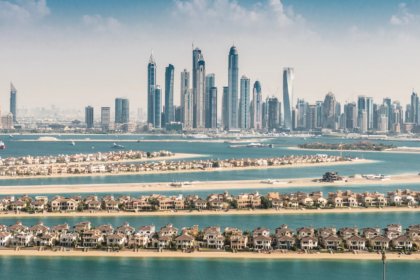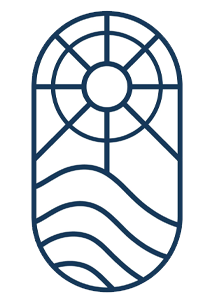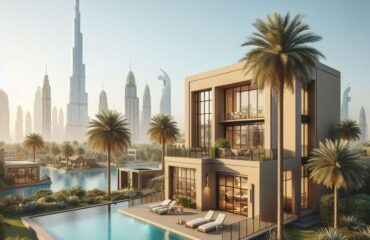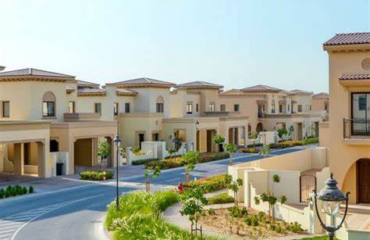
Dubai’s real estate market is thriving in 2024, offering opportunities for both homebuyers and investors. With no property taxes, strong rental yields, and a growing economy, it’s no surprise that people from around the world are drawn to the city.
Understanding Dubai house prices is essential if you’re planning to buy a property. Whether you’re looking for an affordable apartment, a family-friendly home, or a high-end villa, knowing the average house price helps you plan your budget and make smart decisions.
In this guide, we’ll break down the latest trends and explore Dubai property prices across the city’s most popular areas. From luxury developments to affordable communities, we’ll give you all the information you need to find the perfect home or investment.
Understanding Dubai property prices in 2024
The Dubai property prices in 2024 reflect a market that continues to grow and evolve, attracting both local and international buyers. Thanks to the city’s economic stability and status as a global hub for business, tourism, and lifestyle, the real estate sector remains one of its most dynamic industries.
Current trends in Dubai house prices
Over the past year, Dubai’s real estate market has seen steady price growth. The Dubai all-residential property price index (RPPI) rose strongly by 20.71% year-over-year in Q1 2024. This rise is due to increased demand for premium developments, a surge in off-plan sales, and the city’s continued expansion into new areas. Popular areas like Downtown Dubai, Dubai Marina, and Palm Jumeirah remain hotspots for luxury properties, with villa prices in Arabian Ranches experiencing a significant rise of up to 13% in Q3 2024. At the same time, emerging communities like Dubai South and Al Furjan offer more affordable options.
Key factors influencing property prices
Several elements impact Dubai property prices in 2024, including:
- Economic resilience: Dubai’s diversified economy and government initiatives to attract foreign investment play a significant role in sustaining property demand.
- Demand for lifestyle-focused communities: Buyers and renters are increasingly seeking homes with family-friendly amenities, green spaces, and smart home features.
- Strategic locations: Areas with proximity to metro lines, schools, business hubs, and leisure facilities command higher prices.
- Post-pandemic recovery: The return of international travel and increased interest from overseas investors have also boosted property values.
2025 price forecast
Experts predict a balanced growth in Dubai property prices this year. While luxury segments may see higher gains, the affordable housing sector is expected to remain stable. The market is projected to have a Compound Annual Growth Rate (CAGR) of over 8.00% from 2024 to 2029. Communities like Jumeirah Village Circle (JVC) and Business Bay are forecasted to perform well, thanks to their modern developments and competitive pricing.
By staying informed about these trends, buyers can make smarter decisions when navigating Dubai’s real estate market.
What is the average house price in Dubai?
The average house price in Dubai of $760,000 (or AED 2,790,000) provides valuable insights for potential buyers and investors. Dubai’s diverse real estate market caters to a wide range of budgets and preferences, offering everything from compact studios to sprawling luxury villas.
Average prices by property type in Dubai
- Apartments
Apartments remain the most popular property type in Dubai, offering a mix of affordability and convenience. The average price for a studio apartment ranges between AED 367,000 and AED 1.47 million, depending on the location, bedrooms and amenities.
Prime locations like Downtown Dubai and Dubai Marina command higher prices, while areas like Jumeirah Village Circle (JVC) and Al Furjan provide more budget-friendly options. - Villas and townhouses
For families seeking space and privacy, villas and townhouses are the preferred choice. The average price for a 3-bedroom villa ranges from AED 2.5 million to AED 4 million.
Affordable villa communities such as The Springs or Mudon offer 3-bedroom options at a much lower starting price. - High-end luxury properties
Dubai’s luxury property segment is unparalleled, catering to ultra-high-net-worth individuals. Properties in Palm Jumeirah can go for as much as AED 32,000 per square meter. Other luxury developments, like those on Dubai Marina, can command prices upwards of AED 20,000 per square meter.
Factors affecting average prices of houses
The average house price in Dubai varies based on several factors:
- Location: Proximity to key attractions, metro access, and premium areas significantly impacts pricing.
- Amenities: Properties with private pools, gardens, or panoramic views tend to be priced higher.
- Developer reputation: Established developers like Grovy or Nakheel often attract premium buyers.
- Market trends: Economic factors and global events can influence demand, impacting prices across property types.
By understanding these pricing dynamics, buyers can make informed decisions tailored to their preferences and budgets. Whether you’re considering an apartment in a vibrant neighbourhood or a villa in a serene community, there’s a property in Dubai to match your lifestyle.
Factors affecting Dubai house prices
The Dubai house prices you encounter depend on several critical factors, all of which play a role in determining a property’s value. Whether you’re buying a studio apartment, a family villa, or a luxury penthouse, understanding these elements can help you make informed decisions.
Location
In real estate, location is everything, and Dubai is no exception. Areas like Downtown Dubai and Dubai Marina are premium locations known for their luxury, convenience, and world-class amenities. Properties in these areas often command higher prices due to their proximity to iconic landmarks, such as the Burj Khalifa and Dubai Mall.
On the other hand, areas like Jumeirah Village Circle (JVC) and Al Furjan offer more affordable alternatives while still providing excellent community facilities. These neighbourhoods are increasingly popular with families and first-time buyers seeking quality living spaces at a more accessible price point.
Property type and size
The type and size of the property significantly impact Dubai property prices.
- Apartments: Compact studios and one-bedroom apartments in budget-friendly communities like JVC are generally priced lower than spacious apartments in Downtown Dubai or Dubai Marina.
- Villas and townhouses: Larger properties, such as villas, are naturally more expensive, with added costs for private gardens, swimming pools, or waterfront locations.
- Luxury properties: Dubai’s ultra-luxury market caters to high-net-worth individuals, with prices reflecting exclusivity, location, and features.
Market conditions
Dubai’s real estate market operates within a dynamic global and local economic environment.
- Supply and demand: A high influx of expatriates or investors often pushes prices upward, while increased construction and project launches may balance or lower prices.
- Economic stability: The strength of Dubai’s economy, alongside international investment trends, also influences the market. Periods of economic growth often correlate with rising property values.
- Government initiatives: Policies such as residency visa reforms tied to property investment can create surges in demand, impacting prices.
Amenities and facilities
Modern buyers and tenants are looking for more than just a property; they want a lifestyle. Properties with exceptional facilities, such as infinity pools, private gyms, dedicated parking, and 24-hour security, can command a premium. Developments offering unique amenities like golf simulators, co-working spaces, or beachfront access stand out in the competitive market.
Developer reputation
The reputation of the developer behind a project can also significantly affect property values. Established developers such as Emaar, Nakheel, or Grovy Real Estate are known for their quality, delivering homes that blend aesthetics with functionality. Buyers are often willing to pay more for properties developed by trusted names.
Understanding these factors gives potential buyers a clear picture of the property landscape. By evaluating what matters most—be it location, amenities, or property type—buyers can find options that align with their needs and investment goals.
Comparing buying vs renting in Dubai
Deciding whether to buy or rent a property in Dubai is one of the most important financial decisions you’ll make. Both options have their advantages, but the right choice often depends on your lifestyle, financial situation, and long-term plans. Here’s a closer look at the key factors that distinguish buying from renting, helping you determine the best path forward.
Financial considerations: Monthly rent vs long-term investment
- Renting: Renting offers flexibility, especially for expatriates or individuals who may not be ready to commit to Dubai long term. However, the money spent on rent yields no financial return—it’s an expense, not an investment.
- Buying: Purchasing a property can be seen as a long-term investment. With Dubai property prices appreciating in many sought-after areas, owning a home offers the potential for capital growth and even rental income if you decide to lease it out. Mortgage payments often align closely with rental costs, making ownership more appealing for those staying in the city for the foreseeable future.
Flexibility vs stability
- Renting: Renting allows greater freedom to relocate, whether for work or lifestyle changes. This option suits those who value mobility or are exploring different neighbourhoods before committing to a purchase.
- Buying: Homeownership provides stability, especially for families or professionals settling down in Dubai. With the security of owning a property, you’re no longer subject to fluctuating rental markets or lease renewals.
Average rental yields vs homeownership costs
Dubai’s rental market offers some of the highest yields globally, particularly in areas like Business Bay and Dubai Silicon Oasis, which offers an average annual return of 9.29%. However, for investors, owning property can generate consistent income and offer tax-free returns. For residents, the costs of homeownership, including mortgages, maintenance fees, and service charges, often compete favourably with long-term rental expenses.
Pros and cons of renting vs buying
Renting Pros:
- Lower upfront costs (security deposit vs down payment).
- Flexibility to move without being tied to a long-term asset.
- No responsibility for property maintenance.
Renting Cons:
- No return on investment; rent payments are unrecoverable.
- Limited control over the property, including renovations or upgrades.
- Subject to market-driven rent increases and availability.
Buying Pros:
- Opportunity to build equity and benefit from property appreciation.
- Freedom to modify and personalise your space.
- Stability and potential rental income if leasing the property.
Buying Cons:
- Higher upfront costs, including down payments and transaction fees.
- Responsibility for maintenance, repairs, and service charges.
- Potential market fluctuations affecting property value.
What’s right for you?
If you’re considering Dubai as a long-term home, buying may offer the best balance of stability and financial growth. With competitive Dubai house prices, particularly in family-friendly areas like JVC or Al Furjan, owning a property can be a sound investment. Alternatively, renting remains a practical choice for those still exploring Dubai’s neighbourhoods or unsure of their future plans.
Whether buying or renting, making the right decision starts with understanding your goals and financial priorities.
Frequently asked questions about Dubai property prices
What is the average house price in Dubai in 2024?
The average house price in Dubai is around AED 2,790,000.
Which neighbourhood offers the best value for families?
Areas like Jumeirah Village Circle (JVC), Al Furjan, and Dubai Hills Estate offer affordability, family-friendly amenities, and proximity to schools.
How do Dubai property prices compare to other global cities?
Dubai properties are more affordable than those in cities like London or New York, offering luxury at a lower price per square foot.
Are property prices expected to rise?
Yes, Dubai’s market is growing steadily, supported by strong demand and government initiatives.
Is buying off-plan properties a good idea?
Off-plan properties offer competitive prices and flexible payment plans but require careful consideration of the developer’s reputation.
What additional costs should buyers be aware of?
If applicable, expect registration fees (4% of property value), agency fees, service charges, and mortgage-related costs.
Final thoughts on Dubai property prices
Understanding the average house price in Dubai provides valuable insight for anyone exploring the market. From affordable apartments to high-end villas, Dubai offers options for every buyer.If you’re looking to invest or find your dream home, working with experienced developers like Grovy can simplify the journey. With expertise and carefully crafted developments, we’re here to help you navigate the dynamic world of Dubai property prices.








